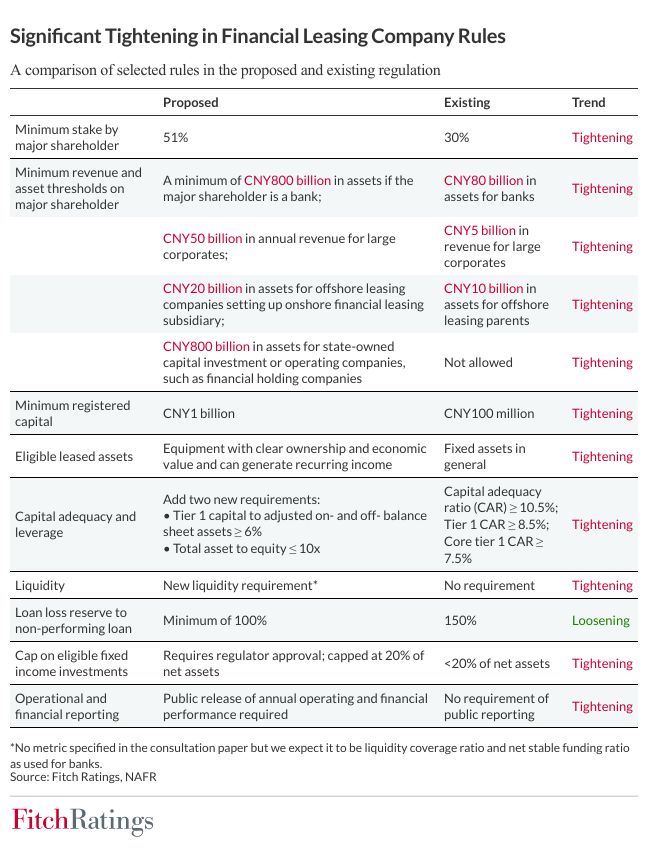
In a move set to heighten regulatory and economic barriers for financial leasing companies, China’s National Administration of Financial Regulation (NAFR), the nation’s centralised financial regulator, has proposed more stringent rules for the sector.
Fitch Ratings anticipates these measures will expedite the exit of weaker and smaller firms while driving further consolidation within the industry.
The consultation paper, published on January 5, outlines key revisions to the regulatory framework governing financial leasing companies, introducing measures aimed at enhancing capital, leverage, and liquidity management.

Fitch Ratings notes that the proposed rules, if effectively implemented, could strengthen the standalone credit profiles of larger financial leasing entities, positively impacting the sector’s long-term development.
One of the significant changes involves the imposition of a leverage cap, restricting the total assets to equity ratio to 10x. Additionally, Tier 1 capital is mandated to cover at least 6% of adjusted on- and off-balance-sheet assets.
The tightening of shareholder requirements signals a regulatory shift towards greater commitment and responsibility from major shareholders, reinforcing the likelihood of parental support for rated Chinese financial leasing companies during challenging times.
How well do you really know your competitors?
Access the most comprehensive Company Profiles on the market, powered by GlobalData. Save hours of research. Gain competitive edge.

Thank you!
Your download email will arrive shortly
Not ready to buy yet? Download a free sample
We are confident about the unique quality of our Company Profiles. However, we want you to make the most beneficial decision for your business, so we offer a free sample that you can download by submitting the below form
By GlobalDataThe proposed revision also raises the minimum shareholding requirement for major shareholders to 51%. However, Fitch Ratings indicates that this adjustment will not affect their rated issuers, as they already comply with the new threshold.
The assessment of shareholder support by Fitch largely reflects the strategic importance of rated financial leasing companies to their parents.
Furthermore, the consultation paper narrows the definition of qualifying lease assets, focusing mainly on equipment with clear ownership, economic value, and the ability to generate recurring income. This shift challenges existing lessors with significant exposure to immovable assets or limited expertise in managing lease assets.
The regulator aims to pivot the sector towards core leasing products, including direct and operating leases, supporting the economy through financing for manufacturing upgrades, green energy, and new infrastructure.
The inclusion of a new section on risk resolutions and exit mechanisms underscores the heightened business challenges and capital pressures faced by some lessors.
The move follows recent industry developments, including the bankruptcy of Guotai Financial Rent and the merger between China National Foreign Trade Financial & Leasing and CRRC Financial Leasing in late 2023.
Fitch Ratings emphasises the importance of the proposed liquidation and restructuring mechanism, providing an orderly exit for high-risk lessors unable to meet the enhanced regulatory requirements. The eased provisioning requirement for non-performing loans is expected to alleviate profitability and capital pressure for other industry players.
China Development Bank Financial Leasing (A+/Stable) stands out with the lowest Tier 1 capital ratio among Fitch-rated Chinese financial leasing companies at 9.9%. Its total asset-to-equity ratio slightly exceeds the new regulatory cap of 10x at the end of the first half of 2023, raising potential concerns within the industry.







